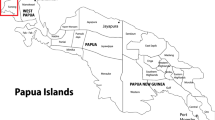Abstract
To estimate the concentration of methemoglobin (MetHb) in malaria patients and correlate with severity of malaria infection. This prospective study included 30 untreated cases of malaria confirmed by Quantitative Buffy Coat (QBC) test and 30 age sex matched non-malarial cases taken as controls. All the patients underwent thorough clinical examination and routine biochemical investigation. Methemoglobin levels were estimated by spectrophotometric (co-oxymeter) method on day 1 and day 10 of diagnosis of all study group patients and correlated with clinical profile and severity. Out of 30 malaria patients 22 were males and eight were females. The clinical presentations in complicated malaria group (n = 21) were fever 21 (100 %), anemia 17 (80.95 %), renal failure 12 (52.38 %) and coma/convulsion 5 (23.8 %). The mean age of the study group was 41.66 years. Mean MetHb in complicated malaria on day 1 was 2.55 ± 1.75 % and day 10 was 10.69 ± 8.19 % (statistically significant). The overall mortality was 13 (43.33 %) among study group while 5 (16.66 %) was found among control group. Mean MetHb who died (n = 13) on day 1 was 3.144 ± 1.829 % and (n = 8) on day 10 it was 19.982 ± 8.406 %. Increase in level of methaemoglobin is detrimental to the body and is associated with increase in mortality. Routine MetHb estimation may be used as a prognostic indicator in the management of malaria patients. It is suggested that addition of drugs which reduce MetHb may be tried along with antimalarial drugs to decrease morbidity and mortality in malaria.
Similar content being viewed by others
References
Prchal JT et al (2005) Red cell enzymes. Hematology Am Soc Hematol Educ Program 1:19–23
Wright RO, Lewander WJ, Woolf AD et al (1999) Methemoglobinemia: etiology, pharmacology and clinical management. Ann Emerg Med 34(5):646–656
Curry S et al (1982) Methemoglobinemia. Ann Emerg Med 11(4):214–221
Rehman HU et al (2001) Methemoglobinemia. West J Med 175:193–196
Marcus H, Nitrate Joeffe J (1949) Methemoglobinemia. NEJM 240:599–602
Erel O, Kocyigit A, Aktepe N, Bulut V (1997) Oxidative stress and antioxidant status of plasma and erythrocytes in patients of vivax malaria. Clin Biochem 8(30):631–639
Carmona-Fonseca J, Alvarez G, Maestre A (2009) Methemoglobinemia and adverse events in plasmodium vivax malaria patients associated with high doses of primaquine treatment. Am J Trop Med Hyg 80(2):188–932
Kochar DK, Tanwar GS, Khatri PC, Kochar SK, Sengar GS, Gupta A et al (2010) Clinical features of children hospitalized with malaria—a study from Bikaner, northwest India. Am J Trop Med Hyg 83(5):981–989
Akompong T, Van Wye J, Ghori N, Halder K (1999) Artemisinin and its derivatives are transported by a vacuolar-network of Plasmodium falciparum and their anti-malarial activities are additive with toxic sphingolipid analogues that block the network. Mol Biochem Parasitol 101:71–79
Uko EK, Udoke AE, Etukudoh MH (2007) Methaemoglobin profile in malaria infected children in Calabar. Niger J Med 12(2):94–97
Anstey NM et al (1996) Elevated level of methemoglobin in Tanzanian childrens with severe and uncomplicated malaria. Trans R Soc Trop Med Hyg 90:147–151
Topal H, Topal Y (2013) Toxic methaemoglobinemia treated with ascorbic acid: case report. Iran Red Crescent Med J 15(12):e12718
Author information
Authors and Affiliations
Corresponding author
Rights and permissions
About this article
Cite this article
Behera, G.C., Behera, S.K., Jena, R.K. et al. Study of Methaemoglobin in Malaria Patients. Indian J Hematol Blood Transfus 32, 100–103 (2016). https://doi.org/10.1007/s12288-015-0522-5
Received:
Accepted:
Published:
Issue Date:
DOI: https://doi.org/10.1007/s12288-015-0522-5



